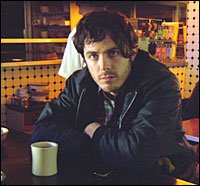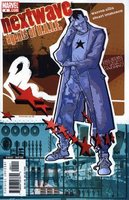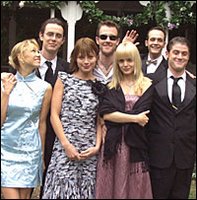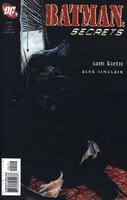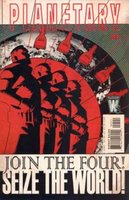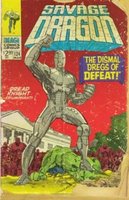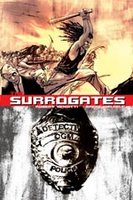I had last week off from work, which for most people might mean a trip out of town or something like that, but I hate traveling, so for me the week was all about sleeping and watching movies.
 Amadeus (Milos Forman, 1984)
Amadeus (Milos Forman, 1984)Epic period pieces aren't usually my favorite genre, but this one mostly kept my interest for its 160 minutes, mixing a healthy dose of camp along with its sweeping angles, sumptuous sets and outsize emotions. F. Murray Abraham does a great slow burn as Salieri, the rival composer who was pathologically jealous of Mozart, and Mozart himself comes off sometimes as so silly that you sort of expect Falco to show up and start singing "Rock Me Amadeus" (which for years I thought was actually in this movie). It's a little underwhelming as a Best Picture and winner of eight Academy Awards, but Forman at least brings a little subversion to the trusty biopic formula.
 Caché (Michael Haneke, 2005)
Caché (Michael Haneke, 2005)I'd been looking forward to seeing this movie for a while now, based on the rapturous reviews and a concept that sounded fascinating to me. So maybe it was inflated expectations, but I did not like it at all. It's not that I have a problem with movies that are obtuse or plotless - read below about how much I enjoyed
Funny Ha Ha - but that the more I thought about this movie, the less it seemed to have to offer. It's fine, I suppose, that Haneke sets up a beguiling mystery and then fails to provide a solution (even if you pay really close attention during the final scene and catch what I missed and had to read about online, it still doesn't really clear much up). But what bothers me is that what he offers in place of a satisfying mystery story is a bunch of muddy allegory, characters who are little but mouthpieces and an unpleasant, unearned condescension.
It's hard to talk in specifics about the failures of this film without delving into spoilers, but I will say that I thought that the parallel between the dark secret in the main character's past and the injustices committed by white westerners on immigrants and Third World countries was not exactly, well, parallel. I just didn't buy Georges's deep dark secret as something to inspire such torture and recriminations, at least not in a way that it could equate to the slaughter of 200 Algerians by French police (the specific historical event referenced in the film) or the systematic repression of racial and ethnic minorities (the implied allegorical meaning). The political commentary is fairly one-note, and once you've either agreed with it or dismissed it, the rest of the film is an exercise in futility. Haneke does some interesting things with the camera, showing scenes from the mysterious video tapes that show up on the central couple's doorstep enough times that you start to question whether each shot is from the tape or a "real" depiction of the action. This isn't a movie about the deceptive power of images, though, which was the only thematic element that held my interest.
 The Company of Wolves (Neil Jordan, 1984)
The Company of Wolves (Neil Jordan, 1984)Weird early horror movie from Jordan, with a surreal, sexualized take on fairy tales, Little Red Riding Hood in particular. It doesn't so much work as a cohesive feature film, but certain individual bits are damn creepy and unnerving, and the effects hold up fairly well considering the time that's passed and the relatively low budget. Made me think of what
The Brothers Grimm could have been if Terry Gilliam wasn't constrained by studio demands for things like plot and character development.
 Funny Ha Ha (Andrew Bujalski, 2002)
Funny Ha Ha (Andrew Bujalski, 2002)I expected something completely different out of this movie, so it took a little getting used to at first. I am a sucker for talky movies about aimless twentysomethings, which is what I expected this to be, but although Bujalski's film may bear plot-level similarities to stuff like
Before Sunrise and
Clerks, its execution could not be more different. The hallmarks of those movies are overly articulate dialogue and excessive intellectualization of the most mundane things, but even though Bujalski's characters are all college graduates with (one assumes) keen pop cultural senses, his dialogue is the very opposite of overly articulate; most of the time, it's barely articulate at all. At first the style is a little off-putting, with every scene full of brutally awkward exchanges and repeated "I don't know"s and "I'm sorry"s. But after a while you start to see how real these interactions are, and how indicative of the ways that people are unable to connect with each other. The intellectual masturbation of those other movies is another distancing effect, and not necessarily any less real, but Bujalski's dialogue highlights the emptiness and desperation of so many everyday interactions, even with people we feel are our friends.
His aesthetic is often crude, as much a product of his tiny budget as a conscious choice, I would imagine, but the acting is generally quite accomplished, especially from star Kate Dollenmayer. The one thing that really pleased me was Bujalski's choice to shoot on film. It's the indie film default these days to shoot on video, so the warm look of film was almost a shock to me at first, and that combined with the grungy settings and naturalistic acting reminded me of early John Sayles, like
The Return of the Secaucus Seven. This is a really polarizing film, and I can understand how it might annoy some people, especially since a superficial description of the plot makes it sound like a standard romantic comedy, but I found it captivating and I hope I get a chance to see Bujalski's undistributed second film,
Mutual Appreciation, some time soon.
 Gigi (Vincente Minnelli, 1958)
Gigi (Vincente Minnelli, 1958)As I'm sure I've admitted before, I'm not exactly a fan of musicals; they're probably my least favorite genre, and I usually look at viewing them like taking some sort of movie critic medicine. But a regular reader has taken me to task for not being familiar enough with the genre, and she is right, so I am doing my best to occasionally throw in a musical in my regular viewing. This is, by most accounts, one of the greats, a winner of nine Oscars including Best Picture, directed by master-of-the-form Minnelli, with classic songs by Lerner and Loewe. I will say that I appreciated many of its better qualities, especially the excellent lead performance by Leslie Caron and the lush (almost overbearing) production design. Its endorsement of thirtysomething men marrying childlike teenagers didn't even bother me too much, since the characters are almost all desexualized (except Maurice Chevalier's dirty old lech, who sings "Thank Heaven for Little Girls," which I'd heretofore known only as a punchline for pedophile jokes). This is definitely a movie that wouldn't work if people weren't breaking into song every few minutes, because it has to be really over the top or it would just seem ridiculous. Did it make me love musicals? No, but I can see what's appealing about it.
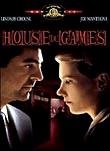 House of Games (David Mamet, 1987)
House of Games (David Mamet, 1987)This was the latest film I watched with my informal film-discussion group (does that not sound like the nerdiest thing ever?). Honestly, I've sort of had enough of David Mamet, especially after sitting through three episodes of his appalling new TV show
The Unit to review it for
Las Vegas Weekly. Mamet is one of those people whose work I was really impressed with at first because I felt like I was supposed to be, and also because it seemed just a little beyond my grasp and I therefore assumed it must be really brilliant. I'm not sure I ever actually enjoyed watching a David Mamet movie, though. Right around the time I watched
Glengarry Glen Ross (which Mamet wrote but didn't direct), I realized that I think this guy is a massive fraud and I'm sick of trying so hard to find something to compliment about his work. His famous dialogue is empty and meaningless, his characters never seem like real people, and his plots are smokescreens. This film in particular doesn't necessarily deserve all that venom, since it's a straightforward con job thriller with a semi-appealing noir tone. But Mamet's direction guarantees stilted performances even from Joe Mantegna, and I didn't once care whether any of the characters pulled off their cons or got murdered in the process.
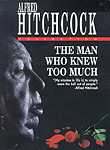 The Man Who Knew Too Much (Alfred Hitchcock, 1934)
The Man Who Knew Too Much (Alfred Hitchcock, 1934)Fairly inconsequential early British Hitchcock, remade in 1956 as fairly inconsequential late American Hitchcock, although slightly better. This has the dry humor and incomprehensible plotting that marks Hitch's early British period, and as such has some fairly amusing bits. But the central orchestra scene is done better in the remake, and the climactic shoot-out in this version is interminable (although apparently inspired by some real-life infamous event, so maybe at the time it had some extra resonance).
 Medium Cool (Haskell Wexler, 1969)
Medium Cool (Haskell Wexler, 1969)I'm sure at the time this was released, with the riots at the 1968 Democratic National Convention in Chicago fresh in people's minds, this was a fairly revolutionary film. It definitely presages a lot of indie film conventions, with its elliptical story, incorporation of real-world events (Wexler shot at the actual Convention and had his actors right in the midst of the riots) and long, impressionistic takes. But man is it boring and tedious. The only parts that are exciting are the footage of the Convention and riots, and that has nothing to do with the story of the listless romance between a TV cameraman and a naive West Virginia transplant. Wexler is primarily a cinematographer and secondarily a documentarian (this is one of only two narrative films he's made in his career), and this definitely plays like a movie made by a cinematographer, concerned more with striking imagery than with story and character. Some of the imagery
is striking, but a lot of the political commentary (especially the media criticism) comes off as facile and hopelessly dated.
 Nina's Tragedies (Savi Gravison, 2003)
Nina's Tragedies (Savi Gravison, 2003)An odd little Israeli comedy with some serious undertones, this is something of a trifle carried by the charming lead performance of Ayelet Zorer as Nina. It's got an almost magical realist tone with its mix of whimsy and melancholy, and ultimately the main problem is that the little kid narrator, who is in love with his aunt Nina, is only not a cipher when he's a rather off-putting jerk. It's nice to see an Israeli movie that's not about war or terrorism (although such things loom occasionally in the background), but I get the feeling that Gravison wasn't sure exactly what his movie
was supposed to be about.
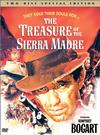 The Treasure of the Sierra Madre (John Huston, 1948)
The Treasure of the Sierra Madre (John Huston, 1948)For some reason I thought this was a sort of lighthearted adventure movie, so I was pleasantly surprised to discover a dark drama about greed and deceit, with Humphrey Bogart embracing nastiness as an American bum in Mexico who goes nuts over prospecting for gold. It's also got quite the bleak and rueful ending for a movie that was nominated for a bunch of Oscars and is considered a mainstream classic. I thought the middle dragged a bit, but overall it was an unexpected and very satisfying film.
 Astonishing X-Men #14 (Joss Whedon/John Cassaday, Marvel)
Astonishing X-Men #14 (Joss Whedon/John Cassaday, Marvel) Runaways #15 (Brian K. Vaughan/Adrian Alphona, Marvel)
Runaways #15 (Brian K. Vaughan/Adrian Alphona, Marvel) Savage Dragon #125 (Erik Larsen, Image)
Savage Dragon #125 (Erik Larsen, Image) X-Factor #6 (Peter David/Dennis Calero, Marvel)
X-Factor #6 (Peter David/Dennis Calero, Marvel)
